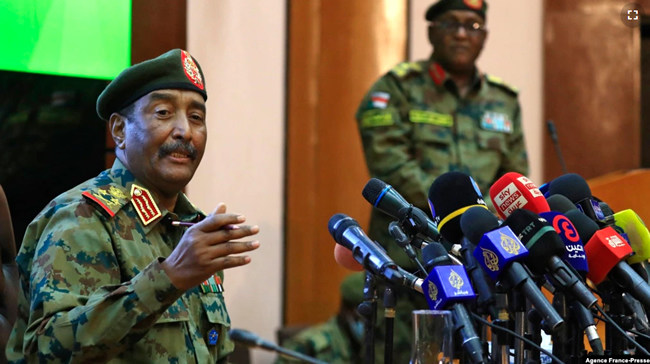
Sudanese military chief General Abdel-Fattah Burhan said Tuesday the army’s overthrow of the country’s transitional government was necessary to avoid a civil war.
“The whole country was deadlocked due to political rivalries,” Burhan said at a televised news conference in Khartoum. “The experience during the past two years has proven that the participation of political forces in the transitional period is flawed and stirs up strife.”
Deposed Prime Minister Abdalla Hamdok and his wife, who had been detained Monday, were allowed to return to their home late Tuesday but were “under close surveillance,” a statement issued by his office reported.
Burhan also acknowledged that “we arrested ministers and politicians, but not all” and said that some would face trial for allegedly inciting a rebellion within the county’s military.
The U.N. Security Council met privately Tuesday to discuss the situation. The United States, along with council members Britain, Estonia, France, Ireland and Norway, called for the session. U.N. Special Representative for Sudan Volker Perthes briefed them from Khartoum.
Before the meeting, several council members reiterated their government’s condemnation of the coup and the need for an end to violence against protesters.
“Two years ago, the people of Sudan put their lives on the line for democracy, and they should not have to do so again,” British Ambassador Barbara Woodward told reporters.
Military chief Burhan declared a national emergency Monday and announced the end of the joint civilian-military Sovereign Council that had run the country since August 2019, shortly after the ouster of longtime autocrat President Omar al-Bashir.
He pledged the military would turn power over to a civilian government in July 2023 after general elections are held.
Demonstrators remained in the streets of Sudan’s capital, Khartoum, to protest the arrest of Hamdok and other officials of the Sovereign Council.
The Sudan Doctors Committee said at least four people were killed and 80 injured Monday when security forces opened fire on demonstrators.
Despite the violence, protesters were on the streets of Khartoum again Tuesday, condemning the coup and shouting “no to military rule.”
The U.S. Embassy in Sudan has warned Americans in the country to shelter in place.
U.N. Secretary-General Antonio Guterres, the African Union and the Arab League were among those alarmed and dismayed Monday at the latest events in Sudan, and they called for the country to stay on a path toward civilian rule.
Guterres also expressed concern about the growing number of coups worldwide. “We are seeing a multiplication of coup d’états” that are the result of “strong geopolitical divides,” he said.
There have been coups this year in Myanmar and in the African nations of Niger, Chad, Mali and Guinea.
He told reporters Tuesday that the Security Council’s “difficulties” in taking strong measures have created an atmosphere in which some military leaders feel they can act with “total impunity.”
“My appeal, obviously, is for — especially the big powers — to come together for the unity of the Security Council in order to make sure that there is effective deterrence in relation to this epidemic of coup d’états,” Guterres said.
The White House said it was “alarmed” by the developments, while the U.S. State Department said it was suspending $700 million in financial assistance to the country.
A joint statement issued by the United States, Britain and Norway through the State Department condemned the coup and called on Sudanese security forces to immediately release all people “unlawfully detained.”
“The actions of the military represent a betrayal of the revolution, the transition, and the legitimate requests of the Sudanese people for peace, justice and economic development,” the statement read.
In a statement Tuesday, Sudan’s ambassador to the U.S., Nureldin Satti, condemned the coup “that has put an end to the civilian democratic transition in Sudan.”
“I am heartened to see that my colleagues in Brussels, Paris and Geneva, and New York have followed suit and condemned the military coup,” Satti added. “We shall work with other colleagues in the diplomatic service and in the diaspora to resist the military coup in support of the heroic struggle of the Sudanese people to achieve the objectives of the December 19, 2018, revolution.”
Hamdok, an economist and diplomat who has worked for the U.N., was named the country’s transitional prime minister in August 2019. The transition received strong support from Western countries, including the United States, which removed Sudan from its state sponsors of terrorism list.
But Hamdok faced stiff resistance from elements of Sudan’s military. On September 21, forces still loyal to al-Bashir used tanks to block a key bridge and attempted to seize power. The coup was put down, and dozens of soldiers were arrested.
Thousands took to the streets last week to protest the prospect of a return to military rule.
“This country is ours, and our government is civilian,” protesters chanted.
Source: voanews.com























